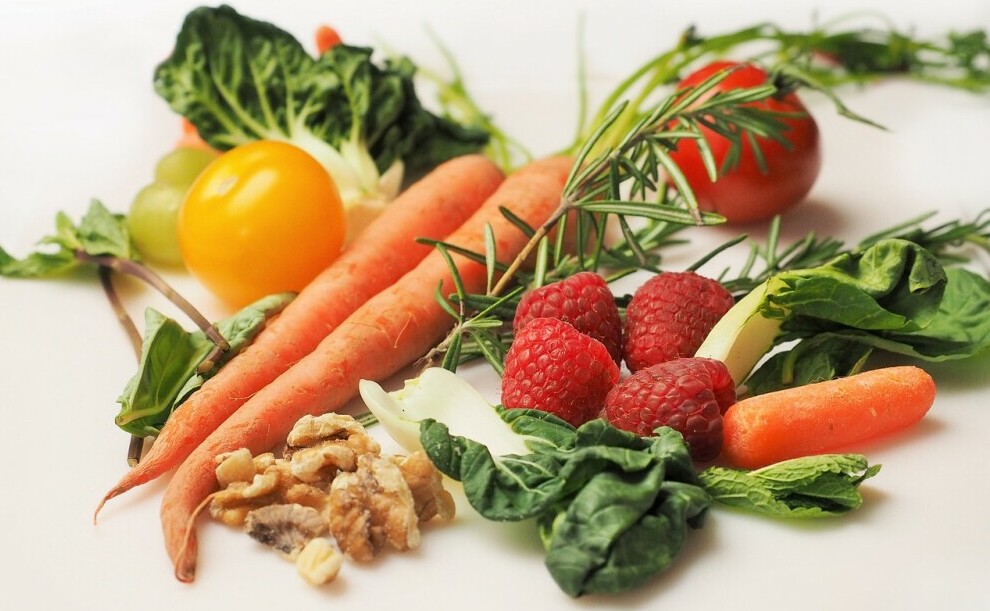 .
.
Plant-based diets focus on foods primarily from plants. This includes fruits, vegetables, nuts, seeds, oils, whole grains, legumes, and beans. It’s not about being vegetarian or vegan; it’s more about proportionately choosing more of your foods from plant sources.
There are several types of plant-based diets, each with its own unique guidelines and benefits. For instance,
- A vegan diet- excludes all animal products, including dairy and eggs.
- A vegetarian diet -allows for dairy and eggs but no meat or fish.
- A flexitarian diet- is mainly plant-based but occasionally includes meat and fish. A pescatarian diet is similar but includes fish and seafood.
- Mediterian diet- emphasizes plant oils, vegetables, fruits, fish, and dairy and includes small portions of meat.
There are plenty of misconceptions about plant-based eating. Some people think it lacks protein or variety, but that’s not the case. If well-planned, plant-based diets can offer all essential nutrients, including protein. These diets aren’t just salads and tofu; they can be as diverse and delicious as any other eating pattern.
Eating more plants is crucial for several reasons. Plants are packed with vitamins, minerals, fiber, and antioxidants. These nutrients help maintain overall health, prevent chronic diseases, and support gut health. They also tend to be lower in calories and fats, aiding in weight management.
It’s also about changing how we think about meat. Rather than the centerpiece of every meal, meat becomes a side dish or an occasional treat. This shift doesn’t mean giving up meat entirely unless you choose to. It’s about creating a balance that leans heavily towards plant foods while still enjoying other flavors and textures when desired.
The Connection Between a Plant-Based Diet and Gut Health

Plant-based diets are essential in nurturing the gut microbiome, consisting of trillions of bacteria, viruses, and fungi in our digestive tract. These organisms impact our digestion, immune system, and even mental health.
One of the primary reasons plant-based diets support gut health is due to their high fiber content. Fiber acts as a prebiotic, feeding the beneficial bacteria in the gut. Fruits, vegetables, whole grains, legumes, and nuts are all packed with a fiber punch, which helps maintain a healthy digestive system. Furthermore, fiber aids in regular bowel movements and prevents constipation.
Plant-based foods also contain anti-inflammatory compounds. Many fruits and vegetables are rich in antioxidants, which help reduce inflammation in the gut. Chronic inflammation is linked to numerous health issues, including gut disorders like irritable bowel syndrome (IBS) and inflammatory bowel disease (IBD). Consuming a variety of plant-based foods can help mitigate these conditions.
Scientific research consistently supports the idea that plant-based diets benefit the gut. Studies have shown that those who follow plant-based diets have a more diverse and stable gut microbiome than those who consume a diet high in animal products. A diverse microbiome is crucial for overall health and resilience against illnesses.
Common gut issues such as bloating, gas, and indigestion often see improvement with a plant-based diet. The high fiber content, along with the presence of essential nutrients, supports a balanced and healthy gut environment. Transitioning to a plant-based diet can significantly improve digestive comfort and efficiency.
Proven Benefits of a Plant-Based Diet for Gut Health
Shifting to a plant-based diet can transform your gut health in numerous ways. The benefits are well-documented and supported by science, making this approach to eating both practical and effective.
- Enhanced digestion and nutrient absorption. Fiber-rich, plant-based diets contribute to a more efficient digestive system. This allows for better absorption of nutrients from your food, optimizing the benefits of each meal.
- The reduction in gastrointestinal disorders. Conditions like irritable bowel syndrome (IBS) and inflammatory bowel disease (IBD) often see marked improvement with increased fiber and anti-inflammatory foods. Many people report fewer symptoms and greater comfort in their day-to-day lives.
- Strengthening the gut barrier. The gut barrier helps keep harmful substances out of the bloodstream while allowing vital nutrients to pass through. A diet rich in fiber and plant-based nutrients supports this barrier, reducing the risk of leaky gut syndrome.
- Significantly boosts immune function. A healthy gut microbiome plays a crucial role in supporting the immune system. By nourishing your gut with various plant foods, you bolster your body’s ability to fend off infections and illnesses.
- Promote a balanced microbiome. A diverse and well-fed microbiome is crucial for overall health. Plant foods’ wide range of nutrients helps maintain this balance, improving digestion, mood, and even clearer skin.
Getting Started with Plant-Based Eating
Transitioning to a plant-based diet doesn’t have to be overwhelming. Start by gradually incorporating more plant-based meals into your routine. You don’t need to overhaul your entire diet overnight. Swap out one or two meals a week with plant-based alternatives and build from there.
When grocery shopping
Focus on the store’s perimeter, where fresh produce, whole grains, and nuts are usually located. These are your plant-based staples. Consider checking out a local farmers’ market for fresh, in-season options that are often more affordable and flavorful.
Meal planning
This can make the transition smoother. Plan your weekly meals to ensure you have all the ingredients on hand. Try to include a variety of fruits, vegetables, grains, and legumes to keep meals interesting and nutritionally balanced. A good tip is to batch-cook and freeze meals for those busy days.
Balance is key to a successful plant-based diet. Ensure you get a mix of protein, healthy fats, and carbohydrates. Beans, lentils, tofu, and quinoa are excellent protein sources. Avocados, nuts, and seeds provide healthy fats, while whole grains and starchy vegetables care for your carbohydrate needs.
Finding plant-based alternatives for common foods can keep you satisfied. For example, use almond or soy milk instead of dairy milk, or try a veggie burger instead of a traditional beef patty. The market contains delicious, plant-based substitutes that make the switch easier and more enjoyable.
Delicious Plant-Based Meal Ideas
Starting your day with vibrant, plant-based breakfasts can set a positive tone. Smoothie bowls packed with your favorite fruits, chia seeds, and nuts are quick and nutritious. Overnight oats offer a grab-and-go solution loaded with fiber. If you have more time, avocado toast with a sprinkle of seeds is filling and tasty.
Lunchtime doesn’t have to be boring. How about a hearty grain bowl? Combine quinoa, mixed greens, roasted vegetables, and a protein like chickpeas or tofu. Wraps filled with hummus, veggies, and grains make for a great portable option. Soups loaded with lentils, beans, and various vegetables are another soothing choice.
Dinner provides so many opportunities to get creative. Try a vegetable stir-fry with tofu over brown rice or a hearty lentil stew. Plant-based pasta dishes with marinara or pesto sauces, packed with veggies, are both comforting and satisfying. Don’t overlook the versatility of homemade veggie burgers loaded with beans and grains.
Snacks can also support gut health. Fresh fruit, raw veggies with hummus, or a small handful of nuts make excellent choices. Consider energy bites from dates, oats, and seeds for a quick, nutrient-dense pick-me-up.
There are plenty of resources and cookbooks dedicated to plant-based recipes. Experimenting with new dishes can be fun to find what you enjoy most. The key is to keep it varied and flavorful.
In Conclusion
Plant-based diets emphasize foods primarily from plants, such as fruits, vegetables, nuts, seeds, and whole grains. These diets aren’t about eliminating all animal products but rather focusing more on plant-based foods. Various approaches, including vegan, vegetarian, flexitarian, and Mediterranean diets, offer different ways to embrace plant-based eating.
Contrary to common misconceptions, well-planned plant-based diets provide essential nutrients, including protein, and significantly support gut health by fostering a healthy gut microbiome through their high fiber and anti-inflammatory properties.
Transitioning to a plant-based diet can be gradual and enjoyable. Start by incorporating more plant-based meals and using alternatives for common foods.
For those interested in learning more and starting this journey, Forks Over Knives―The Cookbook: Over 300 Simple and Delicious Plant-Based Recipes is a highly recommended resource on Amazon. This book offers practical guidance and a variety of recipes to help you switch to a nutritious and balanced plant-based lifestyle.



Hi Zahra!
I have a cousin my age that has been vegetarian for years. He keeps telling me that I should switch, as well, so this post is interesting to me.
Your clear breakdown of the different types of plant-based diets and their benefits, especially for gut health, is really informative. It’s amazing to see how a shift towards more plant-based eating can make such a significant difference in our overall well-being. I love the practical tips for getting started, especially focusing on balance and variety—it’s so important for making this lifestyle sustainable. The meal ideas are also super helpful and show just how delicious plant-based meals can be. Thanks for sharing these valuable insights!
This could be what I need to start changing!
– Scott
Hi Scott!
Thank you for your kind words! I’m glad you found the post informative and resonating with you. It’s great to hear that you’re considering making the switch, especially with your cousin’s encouragement. Focusing on balance and variety does make the transition easier and more enjoyable. I’m thrilled that the meal ideas were helpful in showing how delicious plant-based meals can be. Wishing you all the best as you explore this new path—your health and well-being will definitely thank you!
Great tips for transitioning to a plant-based diet! I started with just swapping out a couple of meals a week and gradually built from there. Planning meals and finding plant-based alternatives really made the process smoother and more enjoyable. Also, checking out local farmers’ markets is a fantastic idea—fresh produce really makes a difference!
The meal ideas in this article are fantastic! I’ve tried several of the suggested recipes, and they’ve been a hit. The grain bowls and veggie stir-fries are my go-to’s now. They’re not only delicious but also packed with nutrients. And those energy bites—what a game-changer for quick snacks!
Hello Kavitha,
Thank you for your thoughtful comment! I’m so glad to hear that the tips and recipes have helped you transition to a plant-based diet. Gradually swapping meals and planning ahead are great strategies. Fresh produce from local farmers’ markets really does make a difference, doesn’t it? I’m thrilled that the grain bowls, veggie stir-fries, and energy bites have become your go-to meals—they’re delicious and packed with nutrients. Thanks for sharing your experience!